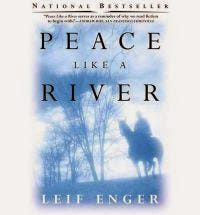Peace Like a River, by Leif Enger

I can’t really say why it took me so long to actually read Peace Like a River by Leif Enger. Perhaps it had something to do with phrases like “most tragic of fates” and “most terrifying of enemies” on the back cover, and the way they filled me with an emotional dread.
But I have now finished it and can say it’s a wonderful book.
It’s a little bit Marilynne Robinson, with it’s empathy and grace towards the sinning, a little bit To Kill a Mocking Bird, with a trial portraying how the public can be swayed on questions of justice and a character as much to be admired as Atticus Finch, a little bit Tim Winton, with it’s extra-ordinary happenings over which we are told to “make of it what you will”, and if I had read any Westerns I’d mention one of those too.
Like Robinson, Enger is very much a Christian, and this is very much a book about faith. But it’s not forced on the reader, rather it’s held out with a stunning attraction in the figure of Jeremiah Land. Neither is the book simplistic in it’s treatment of the stumbling and fallen and it’s representation of a complex ethical dilemma. Here are a couple of excerpts that might serve to prove my point:
You can embark on new and steeper versions of your old sins, you know, and cry tears while doing it that are genuine as any.
...
I began to weep ... weeping seems to accompany repentance most times. No wonder. Could you reach deep in yourself to locate that organ containing delusions about your general size in the world—could you lay hold of this and dredge it from your chest and look it over in daylight—well, it’s no wonder people would rather not.
...
One thing I wasn’t waiting for was a miracle.
I don’t like to admit it. Shouldn’t that be the last thing you release: the hope that the Lord God, touched in His heart by your particular impasse among all others, will reach down and do that work none else can accomplish ...? ....I puzzled it through, concluding that God, feeling overworked on our behalf, had given us ... a parting gift ... Was it unjust? I’d have thought so once, and not long ago. But these activities—whining about what’s fair, begging forgiveness, hoping for a miracle—these demand energy, and that was gone from me.
You know how it is – you grow up with a story all your life, it can transmute into something you neither question nor particularly value. It's why we have such bad luck learning from mistakes.
I could go on. But all I will do is recommend it as a piece of modern fiction that is worth the time it takes to read it, and as a chap called Andrew Roe, from the San Francisco Chronicle, has said on the front cover, “serves as a reminder of why we read fiction to begin with” (and this a good review).

